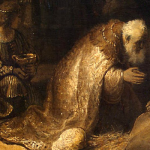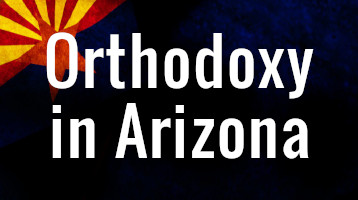
On this page you will find a multitude of articles to clear up the lies, misconceptions, and forgeries about the celebration of Christmas. Teach your children, share with your friends, and don’t take the lies lying down. The celebration of the Nativity of Christ has always been about one thing – the birth of the God-man Jesus Christ in the flesh.
We often hear it said that Jesus was not “really” born December 25th; that this date is a mere fiction, surreptitiously appropriated by church authorities in an attempt to Christianize the pagan solstice, or festival Sol Invictus. However, such charges are actually recent. For almost all of church history, December 25th was received as the actual date of Christ’s birth, handed down from earliest times.
 How We Can Know When Christ Was Born
How We Can Know When Christ Was Born
Why do we celebrate the Nativity of Christ on December 25th? There’s a lot of myth and distortion, as well as outright deception, regarding why Christians celebrate Christmas on December 25th. Much of it is borne of ignorance, but Christians especially should be aware that the Church is a reliable and authentic bearer of truth, and a faithful witness of God’s interactions with man in history. You’ve probably seen many of the strange claims about it. They are all completely false, and even a cursory examination into these claims reveals their falsehood.
The Biblical Case for the Dec. 25th
We often hear it said that Jesus was not “really” born December 25th; that this date is a mere fiction, surreptitiously appropriated by church authorities in an attempt to Christianize the pagan solstice, or festival sol invictus. However, such charges are relatively recent. For most of church history, December 25th was received as the actual date of Christ’s birth, handed down from earliest times. In fact, the evidence from scripture and sacred history supporting the December 25th birth of Christ is actually very substantial.
![]() The Origins of Christmas and the Date of Christ’s Birth
The Origins of Christmas and the Date of Christ’s Birth
Chronological evidence strongly favors December 25th being the actual date of the nativity, such that the assumption Christmas is unconnected with the date of Christ’s birth is no longer academically defensible or sound. Although many Reformers took no exception to Christmas, various Calvinist sects, including Puritans and Scottish Presbyterians, saw it as a piece of fiction, and went so far as to prohibit its observance in England, Scotland, and the American Colonies.
William Tighe explodes the notion we were all taught in public school about the ‘Christianization’ of a pagan festival for the date of Christmas. It is perhaps interesting to know that the choice of December 25th is the result of attempts among the earliest Christians to figure out the date of Jesus’ birth based on calendrical calculations that had nothing to do with pagan festivals. The “pagan origins of Christmas” is a myth without historical substance.
On the Dateline NBC’s “The Birth of Jesus” episode, Dr. John Dominic Crossan, co-founder of the wildly popular Jesus Seminar, called into question the historical veracity of Holy Scripture. Said Crossan: “Luke tells us the story that at the time Jesus was born Augustus had decreed a census of the whole earth. Now, every scholar will tell you there was no such census ever.”
Is Crossan correct? Is the Canon corrupt?
A Pagan Records the Slaughter of the Holy Innocents by Herod
Matthew says that when Herod realized the magi were not going to return, he ordered the slaughter of all male children two years old and under in Bethlehem and the neighboring towns (Matt. 2:16-18). Although Mark and Luke do not mention the Slaughter of the Innocents, John alludes to it in the Apocalypse (Rev. 12:1-4), and thus becomes a witness to the verity of the Matthew’s record. The witness of Matthew and John is also corroborated by a pagan writer named Macrobius.
On the ‘Pagan Origins’ of Christmas
 Six Men Who FAILED to Paganize the Origins of Christmas
Six Men Who FAILED to Paganize the Origins of Christmas
Every Christmas season, the usual myths are hauled out and distributed for popular consumption. You know them. We’ve all heard or read them. That Christmas celebrations were stolen from the Romans, the Christmas tree is pagan, etc. All of them were invented in the 18th- and 19th-centuries by specific writers, who were looking for ways to finally destroy traditional Christianity. Six writers of such legends have had the most long-reaching influence, despite peddling in ahistorical and groundless suppositions.
Christmas Trees: Pagan or Biblical?
 In Defense of the Christmas Tree
In Defense of the Christmas Tree
Several years ago during the Christmas season, a religious program on television caught my attention. The program featured a discussion on the dangers of cults, especially to young people. During the interview, however, one participant made a statement that shocked me. “…and the Christmas tree is pagan too…,” he asserted. The Christmas Tree? Pagan? The Christmas tree does not date from early Germanic times. Its origins are to be found in a tradition that has virtually disappeared from Christianity, the Liturgical Drama.
On Help with Holiday Depression
How to Avoid Holiday Depression
Much of the post-holiday blues and Christmas depression that occur in the United States may have to with the way Christmas is celebrated in the U.S. People often feel deprived and lonely, in stark contrast to all of the pre-Christmas cheer. Changing the way the holiday is celebrated can yield completely different results.
![]()
From Lutheran Satire – Horus Ruins Christmas not just once, but twice!
Sources:
Dec25th.info – the Only Site on the Internet devoted to Proof of Christ’s December 25th Birth
Was Jesus Really Born on Dec 25? Yes – A Biblical Argument for the Birth of Christ in Late December
Six Men Who Tried To Paganize the Origins of Christmas But Failed
The Ancient Feast of Christmas




